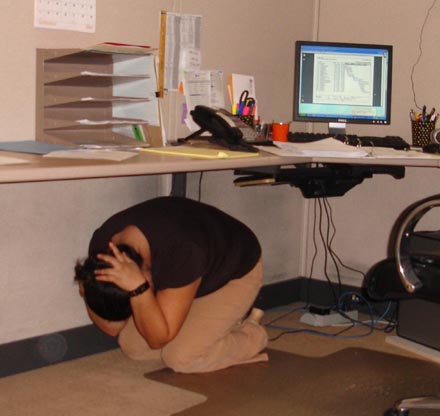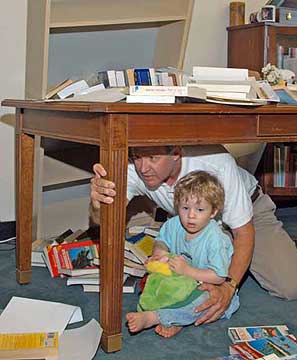When the Shaking Starts
If you are indoors:
- If in a high-rise building – Drop, Cover and Hold On. Avoid windows.
- Do not use elevators.
- If you are not near a desk or a table, drop to the floor next to an interior wall and protect your head and neck with your arms.
- If in bed stay there and cover head with a pillow, get out of bed only when tremors stop and wear footwear.
- Avoid exterior walls, windows, tall furniture, large appliances, cabinets filled with heavy items, hanging objects and mirrors.
If you are outdoors:
- Move to a clear area if you can do so safely; avoid buildings, power lines, trees and other hazards.
- Move to a clear area if you can do so safely; avoid buildings, power lines, trees and other hazards. Always assume power lines are live.
- Near tall buildings then get away from them when shaking starts.
- And driving then when able to safely pull over to the side of the road and stop.
- Avoid overpasses, bridges, power lines, signs, trees and other things that might collapse or fall on the vehicle.
- Stay inside the vehicle until the shaking ends. If a power line falls onto your vehicle, stay inside until a trained person removes the hazard.
After The Earthquake
Check for Damage and Hazardous Conditions
- Fire – If possible, put out small fires in your home or neighborhood immediately. Call for help.
- Damaged Wiring – Shut off power at the main breaker switch if there is any damage to your home. Leave the power off until the damage is repaired.
- Falling Items – Be aware that heavy items may fall off shelves when you open closets and cabinet doors.
- Gas Leaks – Turn off the gas only if you suspect a broken pipe or leak. Don’t turn gas back on by yourself – wait for the gas company.
- Damaged Walls – They may be weakened and could topple during aftershocks.
If your home is damaged:
- Do not reenter your home until you know it’s safe.
- Be sure there are no gas leaks before using open flames or operating electrical equipment.
- Check for faulty electrical wiring and broken water lines. Water contact with faulty wiring is a shock hazard.
- Unplug broken or toppled light fixtures and appliances. These could start fires.



Excellent stuff, especially when we think during shakes we should run outside, instead try to find safe shelter to safe our skull.
SOME VERY IMPORTANT AND LIFE SAVING INFORMATION!
KEEP IT UP NORBERT!
A very informative material. some more points
Turn off power supply and gas line
Use staircase/basement
Crack building be avoided
[…] Earthquake Safety Basics […]
Very Useful 🙂
[…] I’ve been blogging on safety and security matters for over a year trying to compile data on Emergency Services and Ambulance Services and providing tips on Fire Safety and Earthquake Safety Basics […]